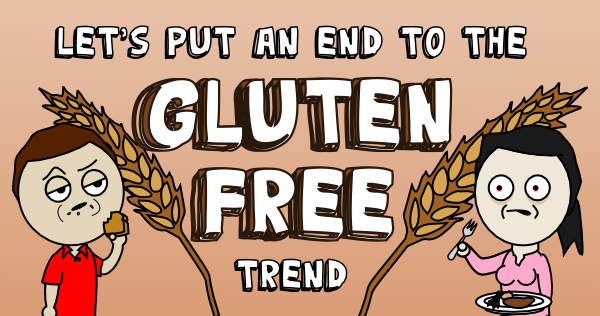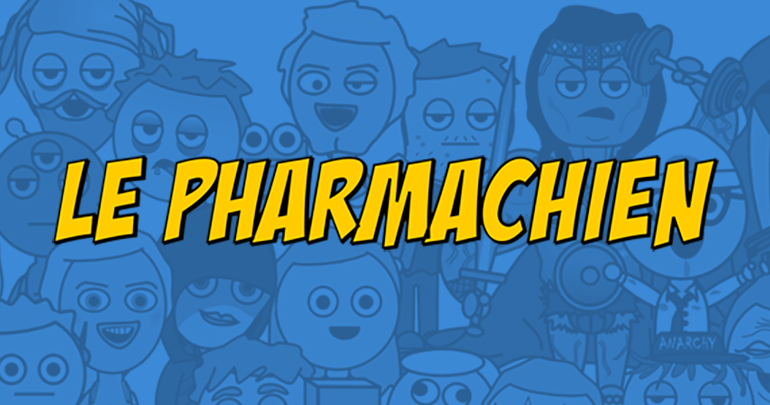After toxins, vaccines, and milk, I’m ready to face another worthy opponent: Gluten.
Or rather the absence of gluten, as many people seem to believe that it’s a good idea to remove it from their diet. Truth be told, for some people, avoiding gluten is a necessity, especially for those who suffer from celiac disease.
Because celiac disease is strongly under-diagnosed, it would be cool to hear more about it… but nowadays, we constantly hear stuff like:
- Gluten is a useless toxin
- Eating gluten-free is healthier
- Eating gluten-free makes you lose weight
- Gluten causes digestive disorders in all people
- Gluten-free food is more organic
- Wheat was genetically modified, resulting in more gluten
- Eating gluten-free is easy
Yet all of these statements are pretty much FALSE.
Do you want to hear more about the topic? You’re in luck: I made a comic that contradicts each of the aforementioned statements! What a coincidence.
To make this project possible, I have had the privilege of collaborating with dietitian Sarah Le, a nutrition scientist specializing in weight management and sports nutrition. She also taught me tons of new words, like “sorghum” and “manioc”!

This comic strip is not intended for two types of people:
- People suffering from celiac disease, as diagnosed by a physician. Gluten is toxic for you, so removing it completely is your only option.
- People who have stopped eating gluten for any reason and deem their health is much better since. I don’t intend to change your mind; after all, you know your body better than anyone else.
This comic is rather intended for the vast majority of people who ask themselves:
‘‘Why is everyone tripping about gluten?!’’
Translation by Hadrien Laforest, proofreading by Lauren Knight.










![]() [purehtml id=1]
[purehtml id=1]
![]()












References:
– What is celiac disease, according to the Celiac Disease Foundation: https://celiac.org/celiac-disease/what-is-celiac-disease/
– Sources of gluten: https://celiac.org/live-gluten-free/glutenfreediet/sources-of-gluten/
– The initial Australian trial about gluten sensitivity without celiac disease: http://www.ncbi.nlm.nih.gov/pubmed/21224837
– The follow-up to the Australian trial, identifying FODMAPs as the probable source of digestive disorders in the patient population: http://www.ncbi.nlm.nih.gov/pubmed/23648697
– The complete list of FODMAPs and recommendations for a diet low in these: https://stanfordhealthcare.org/content/dam/SHC/for-patients-component/programs-services/clinical-nutrition-services/docs/pdf-lowfodmapdiet.pdf
– There appears to be an overlap between irritable bowel syndrome and so-called gluten sensitivity: http://www.ncbi.nlm.nih.gov/pubmed/26690475
– What is organic food and organic labeling standards in the USA (https://www.ams.usda.gov/grades-standards/organic-labeling-standards) and in Canada (http://www.inspection.gc.ca/food/labelling/food-labelling-for-industry/organic-claims/eng/1389725994094/1389726052482).
– Wheat was genetically altered by nature over 8000 years, without human intervention, which tripled its number of chromosomes: http://pcp.oxfordjournals.org/content/52/5/750.full
– Wheat’s nutritional content hasn’t changed for at least 150 years: http://cerealchemistry.aaccnet.org/doi/abs/10.1094/CCHEM-02-15-0029-R.
– There’s no GMO wheat (yet): https://www.aphis.usda.gov/newsroom/2014/09/pdf/ge_wheat.pdf
– Oh and by the way, we don’t know what cavemen ate, but their diet was probably vegetarian and most likely contained a number of cereals and grains (by opposition to what paleo dieters say): http://onlinelibrary.wiley.com/doi/10.1046/j.1467-3010.2000.00019.x/abstract
As a person who lives with celiac, THANK YOU!!!!
There are some raging oversimplifications though. Like claiming the wheat we’ve been eating for the last 150 years is all the same. There are something like 20 cultivars of wheat not counting various hybrids, each having different properties and seed germ sizes and balances of various carbohydrates to protein.
It also soft pitches the entire « organic farming » topic. Disregarding the increased cost and less efficient farming methods that result in smaller, less nutritious produce with higher energy costs per calorie, it calls them « great ». It’s also worth noting that organic does NOT mean « pesticide free », « herbicide free », or « additive free » even though the info pic claims as much.
Additionally there are exactly 0 GMO varieties of wheat available on the market or that are commercially available. Another fact the info pic gets wrong.
Basically this is less about being scientifically accurate and more about being populist and funny.
Hey Dr Chops!
Thanks for your comments! My responses:
1) It’s the nutritional value of wheat that hasn’t changed, not wheat itself. Reference: http://cerealchemistry.aaccnet.org/doi/abs/10.1094/CCHEM-02-15-0029-R
2) I’ve removed the part about organic farming, because it’s a topic on its own. What I was saying about organic food being « great » was about the often creative, innovative nature of the offered products. But yeah, there’s a lot of B.S. too, the labeling is misleading and the regulations are too soft. I’ll come back to that. And you are correct, organic farming involves pesticides and herbicides, just not the « regular » ones. On top of that:
http://www.cbc.ca/news/canada/manitoba/pesticide-residue-found-on-nearly-half-of-organic-produce-1.2487712
3) True, but that’s not me saying it: it’s what people believe. The anti-gluten lobby insists that we eat GMO wheat from Monsanto, and yet it’s not true at all. But hey, maybe I wasn’t clear enough the first time, so I added a sentence saying that, precisely.
Thanks again!
Olivier
Awesome, thanks!
As a celiac the only reason I have been getting more options available is due to the trendy dieters. The more people who buy GF. Makes my super limited food options expand and become cheaper. No it is not easy but it has become much easier over the last 10 years due to the trendiness of my disease.
I have celiac and please no, let the uneducated eat what they want. If the market falls out of the gluten free fad I’ll just be left with crap to eat like how things used to be. I honestly don’t care if a bunch of people are deluded about the health benefits.
I’d rather put an end to the ANTI GLUTEN-FREE trend.
I stopped reading at « whole grain cereals are loaded with fiber – protein – minerals »
This is so wrong it’s not even worth debunking
Upon re-reading, « loaded » doesn’t sound right, I agree.
That being said, the info still stands: https://www.hsph.harvard.edu/nutritionsource/whole-grains/.
So how about « rich in »?
Olivier
I agree about being « rich in »… problematic stuff that binds minerals, promotes inflammation, and has scarce nutritional value.
Limit whole grains consumption as much as you can since they add very little to an omnivorous diet, if you have to then go soaking, fermenting and sprouting, pretty time consuming though.
Otherwise get those fiber from fruit and vegetables, protein from meat and eggs, carbs from « safe starches » and a good micronutrient profile will follow.
« binds minerals, promotes inflammation »
I don’t even understand what that means. Can you be more specific?
« and has scarce nutritional value »
That goes against pretty much everything we know about whole grains.
« Otherwise get those fiber from fruit and vegetables, protein from meat and eggs, carbs from “safe starches” and a good micronutrient profile will follow. »
Grains aren’t essential by any means, so yes. But « safe starches »…?
Olivier
[…] Gluten-free diet (without celiac disease) […]
The RPA Hospital in Sydney has been doing research on ‘chemical intolerance’ in foods. And yes, it’s all chemicals but they’ve focused on a number of naturally occurring and artificially added chemicals that appear to affect health (mainly through lack of absorption and histamine responses). The gastroenterologist I spoke to said one of his biggest challenges in convincing people they aren’t Coaeliacs but have an intolerance to gluten and certain chemicals.
Of course, there can be intolerances to specific substances or foods.
It is unfortunate, however, that some companies convey the idea that one can be intolerant to tons of foods or « chemicals ». IgG food intolerance tests are a good example of this; they are exploitative because that make no sense scientifically, and yet remain very popular and lead people into extraordinarily restrictive diets.
Thanks for your comment!
Olivier
[…] The Pharmafist: Let’s put an end to the GLUTEN-FREE trend […]